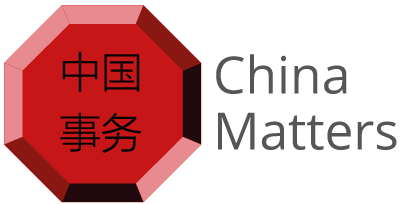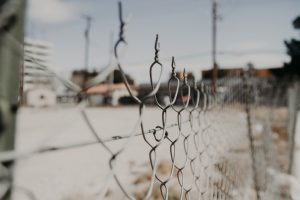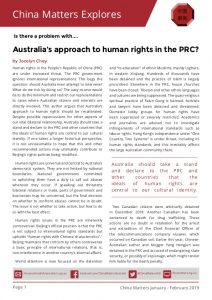Source: Unsplash
Is there a problem with…
Australia’s approach to human rights in the PRC?
By Jocelyn Chey
Human rights in the People’s Republic of China (PRC) are under increased threat. The PRC government ignores international representations. This begs the question: should Australia even attempt to intervene? What do we risk by doing so? The easy course would be to do the minimum and restrict our representations to cases where Australian citizens and interests are directly involved. This author argues that Australia’s approach to human rights should be recalibrated. Despite possible repercussions for other aspects of our vital bilateral relationship, Australia should take a stand and declare to the PRC and other countries that the ideals of human rights are central to our cultural identity. If one takes a longer historical perspective, it is not unreasonable to hope that this and other recommended actions may ultimately contribute to Beijing’s rights policies being modified.
Human rights are universal and central to Australia’s democratic system. They are not limited by national boundaries. National governments committed to upholding them have a duty to call out abuses wherever they occur. If speaking out threatens bilateral relations or trade, parts of government and businesses may be concerned, but the final decision on whether to confront abuses cannot be in doubt. The issue is not whether to take action, but how to do so with the best effect.
Human rights issues in the PRC are inherently controversial. Beijing’s official position is that the PRC is not subject to international rights standards but upholds “human rights with Chinese characteristics”.1 Beijing maintains that criticism by others contravenes a basic principle of international relations, that is, non-interference in another country’s internal affairs.
World attention is now focused on the detention and “re-education” of ethnic Muslims, mainly Uighurs, in western Xinjiang. Hundreds of thousands have been detained and the practice of Islam is largely proscribed. Elsewhere in the PRC, house churches have been closed. Tibetan and other ethnic languages and cultures are being suppressed. The quasi-religious spiritual practice of Falun Gong is banned. Activists and lawyers have been detained and threatened. Domestic lobby groups for human rights have been suppressed or severely restricted. Academics and journalists are advised not to investigate infringements of international standards such as labour rights. Hong Kong’s independence under “One Country, Two Systems” is under threat, including its human rights standards, and this inevitably affects the large Australian community there.
Two Canadian citizens were arbitrarily detained in December 2018. Another Canadian has been sentenced to death for drug trafficking. These actions are no doubt in retaliation for the arrest and extradition of the Chief Financial Officer of the telecommunications company Huawei, which occurred on Canadian soil. Earlier this year, Chinese-Australian author and blogger Yang Hengjun was detained in the PRC and accused of endangering state security, or possibly of espionage, which might render him liable for the death penalty.
The Australian government’s public position on human rights in the PRC has been reactive and inconsistent.2 Canberra prefers a “closed door” approach, although sometimes it has been accused of “megaphone diplomacy”, for instance, when former prime minister Kevin Rudd raised the plight of Tibetans during a speech at Peking University. Neither has proved effective, but the latter has provoked stronger reaction from Beijing. The approach of the Department of Foreign Affairs and Trade (DFAT) “aims to be constructive and is based on dialogue”. The dialogue process has been in abeyance since 2014. Related assistance to the PRC has also been provided through a Human Rights Technical Cooperation Program.3
DFAT’s dialogue partner is the PRC Ministry of Foreign Affairs (MFA). Within the PRC government structure, the MFA has little influence and has no authority to enforce legal and other changes that may be recommended by dialogue partners. In this way, the PRC government isolates discussions and renders them toothless. Alternatively, the MFA can at any time refuse to engage, thus closing this channel for communication.
Australia’s approach so far has not contributed to meaningful improvements. Clearly more needs to be done. But if Australia steps up its lobbying, what would the consequences be?
What are the risks?
Beijing largely ignores international pressure. At best, criticism creates a prickly atmosphere that affects discussion of other issues. Some countries have been punished for taking a stand on human rights. For example, Norway’s relations with the PRC suffered a six-year diplomatic freeze after human rights defender Liu Xiaobo was awarded the Nobel Peace Prize in 2010. Australian political leaders therefore generally avoid mention of human rights in their public utterances about the PRC. Beijing consequently concludes that rights are not a priority for Canberra and disregards representations. Prime Minister Scott Morrison did not raise the subject in his first speech on the Australia-China relationship in October 2018.4 However, Foreign Minister Marise Payne raised the plight of detained Uighurs in Xinjiang at a November 2018 meeting with her counterpart.5
If Australia raises rights issues only after they have been taken up by the United States, this reinforces the PRC view that Australia simply follows US policy. This weakens our ability to be taken seriously on all bilateral matters.
Dialogue on human rights issues may descend into tit-for-tat accusations. Australia is sensitive to this possibility since being elected to the UN Human Rights Council (UNHRC) and would prefer not to expose its own shortcomings such as the treatment of asylum seekers and Aborigines to international scrutiny.
There is reason to fear that human rights abuses might be exacerbated by greater international lobbying. The Communist Party of China (CPC) paints such action as part of an anti-China conspiracy. This in turn stirs nationalist sentiment, which only discourages PRC citizens from dispassionately considering human rights abuses of minorities in the PRC, for example.
What more can Australia do?
Foreign policy in the PRC under President Xi is trending against internationalism, affected by residual and continuing anti-foreign sentiment from public opinion campaigns. If Australia wishes to see actual results from its lobbying on human rights, it will have to try much harder and expand its efforts beyond existing measures. This is more likely to prove effective if it is based on coordination with other international organisations and partners.
As a first step, the Australian government should draw up a statement of the principles on which our defence of human rights is based. The wording should be broadly canvassed with regional partners before being put to the PRC in a coordinated fashion.
Coordinated targeted sanctions may also be considered. These would convey the importance attached to human rights by the international community. Within the PRC government, the need to respond to the threat of sanctions would raise the discussion above the MFA to senior echelons of the Party and government. Australia should strongly consider passing legislation similar to the proposed European Union Global Human Rights Sanction Regime which would make it easier to place sanctions on individuals involved in egregious human rights abuses.6
To introduce this new and tougher line on our approach to human rights, a public statement should be prepared by DFAT, providing a concise outline of our commitment to maintaining standards worldwide. This should be presented and discussed with other national governments including the PRC.
Since Australia and the PRC are both members of the UNHRC, this forum presents valuable opportunities for informal and formal discussions. (The US resigned its membership earlier this year. Australia should re-apply for a seat at the earliest opportunity). In November 2018, the UNHRC conducted its third Universal Periodic Review (UPR) of human rights in the PRC.7 Although the PRC response to the UPR was widely panned,8 the PRC highly values its UN membership. It has signed more than 20 international treaties (but not the International Covenant on Civil and Political Rights) and drawn up an official Action Plan on human rights for the period 2016 to 2020.9
When one takes a long-term view of the development of PRC rights policies, it is clear that some standards have been modified over time to conform more closely to international norms. For instance, women’s rights in the PRC have improved greatly since the Fourth World Conference on Women, which took place in Beijing in 1995. That conference introduced international perspectives to local participants, encouraging them to lobby with their government for greater protections.
On particular human rights issues involving both countries’ interests, Australian government action should be coordinated with international players where possible. Private representations are more effective if they are backed up by public statements. The language of such statements and the venue for their delivery should be chosen judiciously to avoid inflaming latent nationalist sentiment in the PRC. Australia has a flourishing Chinese-language press that can be used to convey a consistent message on human rights and relevant engagements with the PRC on these rights to readers in the PRC. Though, as most Australia-based Chinese-language media are owned by PRC-leaning organisations, Canberra should be vigilant for potential distortion of the Australian government’s messaging.
Protection of the rights of Australians in the PRC is a priority for Canberra. The recent detention of Australian citizen Yang Hengjun shows that the PRC government will not hesitate to warn Chinese-Australian communities of the risks of political activism directed against the CPC. Canberra’s travel advisory service should advise Australian citizens travelling to the PRC about sensitive topics and particular areas of danger, such as the arbitrary rule of law.
Non-governmental organisations (NGOs) can play a vital role in liaison with other countries and lobbying for international representations and actions. Canberra should support the major NGOs financially, and encourage them to maintain their networks of contacts. Scholars should be encouraged to continue research programs that in the past have yielded invaluable information on rights issues in the PRC.
The PRC government has pursued Party officials and businessmen accused of corrupt practices who have fled overseas. The PRC signed an extradition treaty with Australia in 2007, but that treaty has not yet been ratified due to Australian concerns about the PRC legal system, including frequent resort to the death penalty. The PRC is keen for Australia to ratify. Delay in doing so presents an opportunity for Canberra to insist on observance of international norms.
In 2019, as the human rights situation in the PRC deteriorates, action by the Australian government is essential.
What does this mean for Australia?
Recommendations
- The Australian government should publish a comprehensive statement of its commitment to universal human rights, as a core element of what Australia stands for. This statement should establish the principles on which dialogue can be based, and justify criticism of the PRC and other countries that fail to meet the standards as described.
- This statement should be discussed and shared with regional and like-minded international partners, with a view to coordinating responses to human rights abuses in the PRC.
- Australian demarches should be coordinated with the UN and with other governments and agencies. Priority should be given to issues where Australia is clearly affected by the outcome, for example, the detention and charging of Chinese-Australian citizen Yang Hengjun.
- The Australian Parliament should pass legislation similar to the proposed EU Global Human Rights Sanction Regime, or a sufficiently rigorous version of the Magnitsky Act, so that it has the option to enforce coordinated targeted sanctions against individuals directly involved in human rights abuses.
- The agenda for all high-level visits to and from the PRC should include discussion of human rights issues and particular cases of concern.
- A ‘track-two’ bilateral dialogue should be proposed involving academic lawyers working in the field of human rights and comparative law.
- Canberra should not ratify the proposed extradition treaty with the PRC until there is a significantly more transparent and independent legal system in the PRC.
- The Australian government should publicise Australia’s human rights advocacy in Chinese-language media, in the hope that this will reach the public in the PRC.
- Canberra should support human rights organisations in Hong Kong and include discussion of Hong Kong affairs in dialogues with the PRC.
Author
Professor Jocelyn Chey AM is a former Australian diplomat and Visiting Professor at the University of Sydney. Her diplomatic service included three postings in China and Hong Kong, concluding with an appointment as Consul-General in Hong Kong (1992-1995). She was the key administrative officer in the Australia-China Council at the time that it was founded in 1979. She has been awarded an Australia-China Council Medal, was made a Member of the Order of Australia (AM), and is a Fellow of the Institute of International Affairs (FAIIA).
China Matters does not have an institutional view; the views expressed here are the author’s.
This policy brief is published in the interests of advancing a mature discussion of Australia’s approach to human rights in the PRC. Our goal is to influence government and relevant business, educational and non-governmental sectors on this and other critical policy issues. We welcome alternative views and recommendations, and will publish them on our website. Please send them to [email protected].
China Matters and the author are grateful for comments from the five reviewers who received the draft text anonymously. The reviewers represented diverse expertise, from international human rights and security specialists to government officials and foreign policy academics.
Notes
- ‘National report submitted in accordance with paragraph 5 of the annex to Human Rights Council resolution 16/21** China’, UN Human Rights Council Working Group on the Universal Periodic Review, Thirty-first session, 20 August 2018, https://documents-dds-ny.un.org/doc/UNDOC/GEN/G18/254/62/PDF/G1825462.pdf
- For a useful historical record of engagement with the PRC regarding human rights since 1997 see Geremie Barmé, ‘The Australia-China Story Archive: Human and Political Rights’, Australian Centre on China in the World, http://aus.thechinastory.org/archive/human-and-political-rights/
- ‘China country brief’, Australian Government Department of Foreign Affairs and Trade, https://dfat.gov.au/geo/china/pages/china-country-brief.aspx.
- ‘Remarks, Hurstville Community Lunch’, Office of the Prime Minister of Australia, 4 October 2018.
- ‘Marise Payne raised Uighur concerns during China meeting’, SBS News, 8 November 2018, https://www.sbs.com.au/news/marise-payne-raised-uighur-concerns-during-china-meeting
- An Australian version of the Magnitsky Act has been introduced to Parliament under the name of Michael Danby in December 2018 which would allow the government to impose sanctions on individuals involved in egregious human rights violations. The Magnitksy Act was passed by the US Congress in 2012 to enable sanctions against Russian officials responsible for the death of anti-corruption lawyer Sergei Magnitsky, and similar legislation has been passed in the UK and Canada. The EU framework will require a more rigorous requirement of proof before imposition of sanctions.
- ‘National report submitted in accordance with paragraph 5 of the annex to Human Rights Council resolution 16/21** China’, 2018
- ‘Report of the Working Group on the Universal Periodic Review** China’, UN Human Rights Council Universal Periodic Review, Eleventh session, 5 October 2009, https://documents-dds-ny.un.org/doc/UNDOC/GEN/G09/162/99/PDF/G0916299.pdf
- ‘National Human Rights Action Plan of China (2016-2020)’, State Council Information Office of the PRC, August 2016


